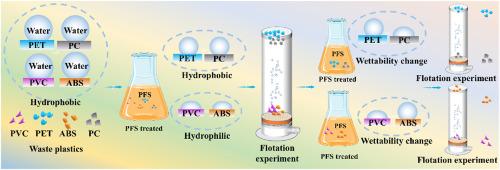Surface treatment through polymeric ferric sulfate for progressive flotation separation of waste plastics
IF 10
1区 环境科学与生态学
Q1 ENGINEERING, ENVIRONMENTAL
引用次数: 0
Abstract
Plastics offer considerable convenience in daily life and human health. However, a substantial amount of waste plastics is released into the environment without proper treatment, posing significant environmental challenges. Recycling and separating waste plastics is difficult due to their similar chemical and physical properties. This study introduces a novel method combining polymeric ferric sulfate (PFS) modification with flotation for efficient plastic separation. In order to achieve the optimal flotation conditions, single parameter experiments were used to confirm the key variables that have a close correlation with the flotation performance, namely PFS dose, temperature, time and pH value. PFS has different hydrophilic effects on polycarbonate (PC), acrylonitrile-butadiene-styrene (ABS) and polyvinyl chloride (PVC) surfaces, whereas polyethylene terephthalate (PET) remains unaffected. For purpose of achieving the individual separation of the plastics, a stepwise flotation method was used. After the primary separation, PET and PC were discharged, while all plastics were individually separated and retained at high purity through the secondary separation process, resulting in 100% purity for both PET and PVC. PC and ABS can achieve 97.4% and 94.5% purity in triplicate validation tests, respectively. Surface modification mechanisms were investigated using X-ray Photoelectron Spectroscopy (XPS), Fourier Transform Infrared Spectroscopy (FT-IR), and Scanning Electron Microscopy (SEM). Based on varying functional groups and surface potentials, PFS can adhere to different plastic surfaces for extended durations, creating the hydrophilicity difference. Nonhomogeneous adsorption of PFS on plastics surfaces was described by characterization and adsorption kinetics. The hydrophilization order and PFS adsorption capacity were consistent: PVC > ABS > PC > PET. The interaction between PFS and plastics was explained by density functional theory (DFT) simulations, the long-chain molecules and numerous hydroxyl groups primarily interact with the plastic surface through electrostatic forces and hydrogen bonds. Through optimization of the PFS treatment process, the consumption of the modification reagent was successfully reduced to 56.51 g/ton of waste plastic with the reuse of PFS. Our process optimization assessment highlights that PFS treatment is a highly effective method for recycling waste plastics.


聚合硫酸铁表面处理对废塑料的递进浮选分离
塑料为人们的日常生活和健康提供了极大的便利。然而,大量的废塑料未经适当处理就被排放到环境中,对环境构成了重大挑战。由于废塑料的化学和物理性质相似,回收和分离是困难的。介绍了一种将聚合硫酸铁(PFS)改性与浮选相结合的塑料高效分离方法。为获得最佳浮选条件,采用单参数试验确定了与浮选性能密切相关的关键变量PFS用量、温度、时间和pH值。PFS对聚碳酸酯(PC)、丙烯腈-丁二烯-苯乙烯(ABS)和聚氯乙烯(PVC)表面具有不同的亲水性,而聚对苯二甲酸乙二醇酯(PET)则不受影响。为了实现塑料的单独分离,采用了分步浮选法。一次分离后,PET和PC被排出,所有的塑料被单独分离,并通过二次分离保留了高纯度,PET和PVC的纯度都达到100%。在三次验证试验中,PC和ABS的纯度分别达到97.4%和94.5%。利用x射线光电子能谱(XPS)、傅里叶红外光谱(FT-IR)和扫描电镜(SEM)对表面改性机理进行了研究。基于不同的官能团和表面电位,PFS可以在不同的塑料表面粘附较长时间,从而产生亲水性差异。通过表征和吸附动力学描述了PFS在塑料表面的非均匀吸附。亲水性顺序和PFS吸附量一致:PVC >;ABS的在电脑比;宠物。密度泛函理论(DFT)模拟解释了PFS与塑料之间的相互作用,长链分子和大量羟基主要通过静电力和氢键与塑料表面相互作用。通过对PFS处理工艺的优化,成功地将改性剂的用量降至56.51 g/t废塑料,并实现了PFS的再利用。我们的工艺优化评估强调了PFS处理是一种高效的废塑料回收方法。
本文章由计算机程序翻译,如有差异,请以英文原文为准。
求助全文
约1分钟内获得全文
求助全文
来源期刊

Journal of Cleaner Production
环境科学-工程:环境
CiteScore
20.40
自引率
9.00%
发文量
4720
审稿时长
111 days
期刊介绍:
The Journal of Cleaner Production is an international, transdisciplinary journal that addresses and discusses theoretical and practical Cleaner Production, Environmental, and Sustainability issues. It aims to help societies become more sustainable by focusing on the concept of 'Cleaner Production', which aims at preventing waste production and increasing efficiencies in energy, water, resources, and human capital use. The journal serves as a platform for corporations, governments, education institutions, regions, and societies to engage in discussions and research related to Cleaner Production, environmental, and sustainability practices.
文献相关原料
公司名称
产品信息
阿拉丁
Hydrochloric acid (HCl)
阿拉丁
Hydrochloric acid
 求助内容:
求助内容: 应助结果提醒方式:
应助结果提醒方式:


